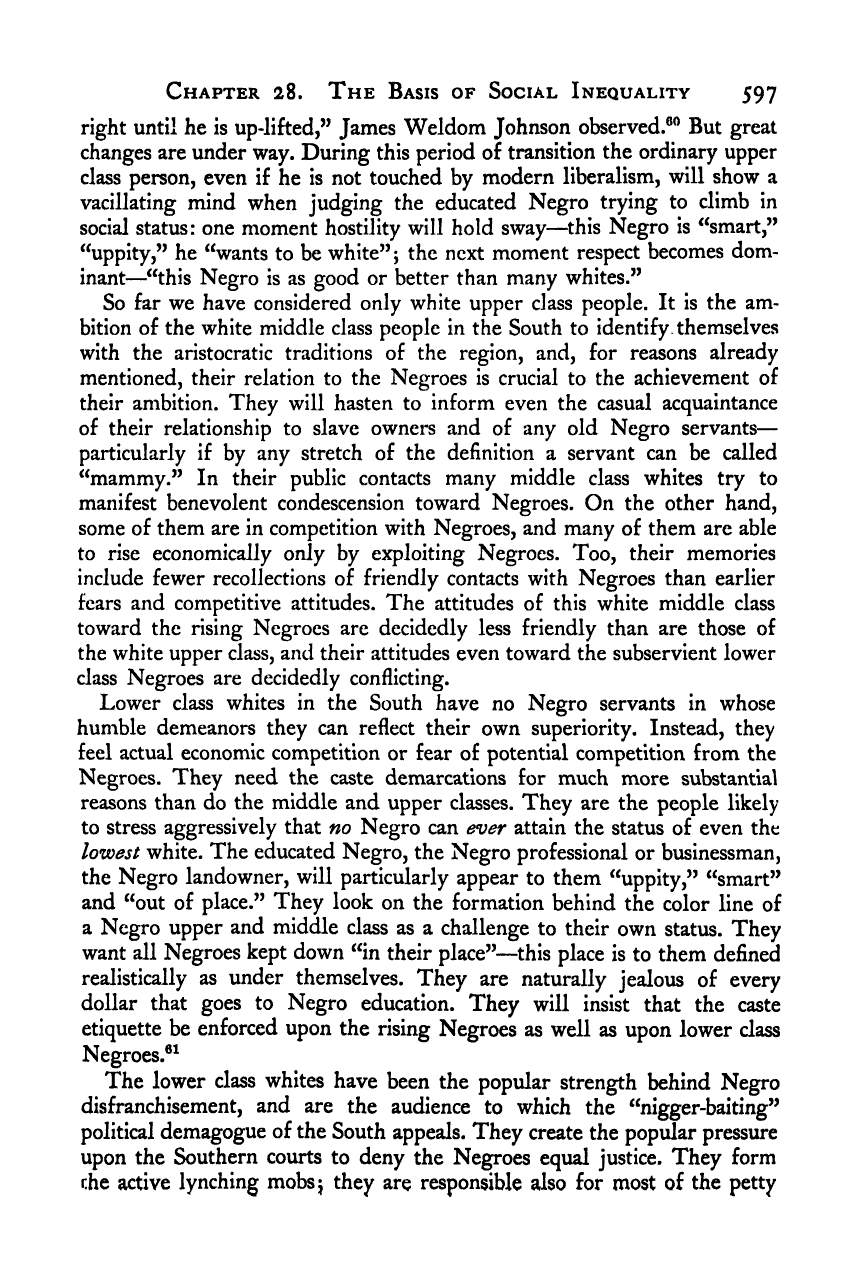Note: Gunnar Myrdal died in 1987, less than 70 years ago. Therefore, this work is protected by copyright, restricting your legal rights to reproduce it. However, you are welcome to view it on screen, as you do now. Read more about copyright.
Full resolution (TIFF) - On this page / på denna sida - VII. Social Inequality - 28. The Basis of Social Inequality - 8. Attitudes among Different Classes of Whites in the South

<< prev. page << föreg. sida << >> nästa sida >> next page >>
Below is the raw OCR text
from the above scanned image.
Do you see an error? Proofread the page now!
Här nedan syns maskintolkade texten från faksimilbilden ovan.
Ser du något fel? Korrekturläs sidan nu!
This page has never been proofread. / Denna sida har aldrig korrekturlästs.
Chapter 28. The Basis of Social Inequality 597
right until he is up-lifted,” James Weldom Johnson observed.®^ But great
changes are under way. During this period of transition the ordinary upper
class person, even if he is not touched by modern liberalism, will show a
vacillating mind when judging the educated Negro trying to climb in
social status: one moment hostility will hold sway—this Negro is ^^smart,”
^^uppity,” he “wants to be white”; the next moment respect becomes dom-
inant
—“this Negro is as good or better than many whites.”
So far we have considered only white upper class people. It is the am-
bition of the white middle class people in the South to identify themselves
with the aristocratic traditions of the region, and, for reasons already
mentioned, their relation to the Negroes is crucial to the achievement of
their ambition. They will hasten to inform even the casual acquaintance
of their relationship to slave owners and of any old Negro servants
particularly if by any stretch of the definition a servant can be called
“mammy.” In their public contacts many middle class whites try to
manifest benevolent condescension toward Negroes. On the other hand,
some of them are in competition with Negroes, and many of them are able
to rise economically only by exploiting Negroes. Too, their memories
include fewer recollections of friendly contacts with Negroes than earlier
fears and competitive attitudes. The attitudes of this white middle class
toward the rising Negroes are decidedly less friendly than are those of
the white upper class, and their attitudes even toward the subservient lower
class Negroes are decidedly conflicting.
Lower class whites in the South have no Negro servants in whose
humble demeanors they can reflect their own superiority. Instead, they
feel actual economic competition or fear of potential competition from the
Negroes. They need the caste demarcations for much more substantial
reasons than do the middle and upper classes. They are the people likely
to stress aggressively that no Negro can ever attain the status of even the
lowest white. The educated Negro, the Negro professional or businessman,
the Negro landowner, will particularly appear to them “uppity,” “smart”
and “out of place.” They look on the formation behind the color line of
a Negro upper and middle class as a challenge to their own status. They
want all Negroes kept down “in their place”—this place is to them defined
realistically as under themselves. They are naturally jealous of every
dollar that goes to Negro education. They will insist that the caste
etiquette be enforced upon the rising Negroes as well as upon lower class
Negroes.®^
The lower class whites have been the popular strength behind Negro
disfranchisement, and are the audience to which the “nigger-baiting”
political demagogue of the South appeals. They create the popular pressure
upon the Southern courts to deny the Negroes equal justice. They form
die active lynching mobs; they are responsible also for most of the petty
<< prev. page << föreg. sida << >> nästa sida >> next page >>